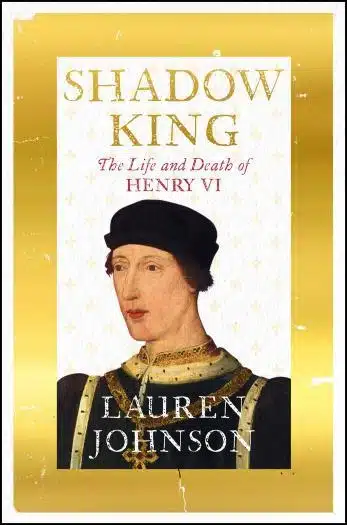For English review, please scroll down.
יש מלכים שנולדים עם אש בעיניים, ויש כאלה שנולדים כדי להישרף בה.
הנרי השישי היה מהסוג השני: תינוק בן פחות משנה, שירש ממלכה של תהילה, חטאים ופחדים.
בספר Shadow King לורן ג’ונסון מספרת את סיפורו של המלך החלש ביותר בתולדות אנגליה, אבל אולי גם האנושי שבהם.
ספרה איננו רק ביוגרפיה היסטורית, אלא ניתוח כמעט פסיכולוגי של כוח שמתפורר מבפנים.
היא פורמת את עלילת חייו של הנרי כחוט דקיק הנמתח בין שתי תשוקות בלתי ניתנות לגישור: הרצון להיות קדוש והחובה להיות מלך.
ילדות שנולדה לחולשה
כשאביו, הנרי החמישי, מת ב־1422, אנגליה נשלטה בידי שני גברים רבי כוח: ג'ון מלנקסטר, דוכס בדפורד, ואחיו המפרי, דוכס גלוסטר.
שניהם ראו בתינוק סמל ולא מלך.
ג’ונסון מתארת זאת כמלכות שנולדה בוואקום מוסרי: במקום אב שהוא מודל של עוצמה, הקיפו את הנרי יועצים שמונעים מתאוות כוח, שיגעון לשליטה, תחרות וחשדנות.
ובתווך ילד שגדל בניסיון לרצות ולפייס את שני דודיו. כבר בינקותו הוא הפנים את ההתנהגות המסוכנת ביותר שלו: הוא למד לפייס במקום להכריע, להרגיע במקום למשול.
העוינות בין שני דודיו של הנרי ה־6 היא בעצם הסדק הראשון שמבשר את המשבר העמוק בהמשך: אם הדודים של המלך לא מסוגלים להסתדר, כל האצולה נחלקת למחנות. ומשם הדרך קצרה לשנאה הגדולה באמת: לנקסטר מול יורק.
💔 המלך שביקש שלום וקיבל תבוסה
הנרי השישי לא רצה למלוך. הוא רצה להאמין.
בעולם שנבנה על ברזל ודם, הוא ביקש להחזיק את הממלכה בעדינות, כמו שמחזיקים תינוק בן יומו.
אבל הממלכה רצתה גבר שיילחם, לא גבר שיתפלל.
כשבורדו נפלה, כשנורמנדי אבדה, הוא לא איבד רק שטחים, הוא איבד את אמון הנתינים והאצילים.
ובכל פעם שניסה לסלוח, הם ראו בזה חולשה. בכל פעם שבחר בחמלה, הם פירשו את זה כפחד.
לאורך כל הדרך, הוא האמין שאלוהים שומע אותו. אבל נראה שאלוהים, כמו נתיניו, כבר הפסיק להקשיב.
👑 מרגרט מאנז’ו: המלכה שנולדה לשרוד
הנישואים למרגרט מאנז’ו היו עסקה פוליטית שנועדה להבטיח שלום עם צרפת.
אבל כשהשלום התפורר, היא נותרה זרה ובודדה בלב ממלכה קרועה ומדממת.
מרגרט לא נולדה להיות מלכה, היא נולדה לשרוד גברים.
היא ראתה את בעלה מתפורר מול עיניה, אהבה אותו אולי, אבל גם ריחמה עליו.
היא למדה לדבר בשפתם של הגברים: שפה של סכינים, של חשד, של כוח.
וכל מילה שלה כוסתה בעוד שכבה של אכזריות.
הם שנאו אותה על מה שנאלצה להפוך להיות, בדיוק כמו שהם בזו לבעלה על מה שהוא לא הצליח להיות.
כשנולד אדוארד, בנם היחיד, הופצה שמועה שהילד איננו של המלך. כדי להכפיש אישה, די לייצר סביבה רחש של בגידה.
ריצ’רד דוכס יורק וההפיכה הבלתי נמנעת
ריצ'רד, דוכס יורק, היה מהבודדים שהבינו את גודל הריק.
כשמלך מאבד אחיזה במציאות, מישהו אחר תמיד יתפוס אותה. ריצ’רד היה האיש ההוא.
ג’ונסון מתארת את שני הגברים כשני קצוות של אותה תקופה: ריצ'רד מגלם את הפוליטיקה החדשה, הפרגמטית, והנרי את האמונה הישנה, התמימה.
ההתנגשות ביניהם הייתה בלתי נמנעת.
כשהמלך חלה ושקע בקטטוניה נפשית, המערכת קרסה לתוך עצמה: מלך חולה, מלכה שנאבקת למען עתיד בנה, ודוכס שמבקש צדק ובפועל כתר.
למרות חשדותיו, פעם אחר פעם הנרי ה־6 סירב להוציא את ריצ'רד דוכס יורק ותומכיו להורג, ומחל לו על חתרנותו.
כל עוד הנרי ה־6 סירב להוציא את ריצ’רד דוכס יורק ותומכיו להורג, האש שבערה מתחת לפני השטח נותרה כבושה.
אבל כשוויקפילד עלתה בלהבות וראשו של ריצ’רד נערף והוצב על החומה עם כתר נייר, נולדה אש אחרת.
אדוארד בנו ראה, לא שכח ולא סלח.
מרגע זה, הנקמה הפכה לדלק שהבעיר את נפילת בית לנקסטר.
בסוף, אדוארד הרביעי, ישלים את העבודה שאביו החל בה ויעלה לכס.
🕯️ מלך הצללים
הנרי השישי לא נעלם ביום אחד.
הוא הלך ונמוג, קרס לתוך עצמו שכבה אחר שכבה, כמו נר שממשיך לדעוך גם אחרי שכבר כבה.
הוא נלכד, שוחרר, הוחזר, שוב נלכד, הוגלה ושוב חזר לכס.
בכל פעם כבדיחה מרירה של הגורל.
הוא היה בכל מקום: במצודה, בגלות, בשירים, בתפילות, אבל אף פעם לא באמת שם.
נוכח בהיעדרו, לא רק מן הארמון אלא גם מתודעת עמו.
כשנרצח, זה כבר לא היה מעשה שנאה, אלא כמעט מחווה של חסד.
כי האמת היא שהוא מת מזמן; ביום שבו האמין שאפשר לרצות את כולם, ובחר בפיוס במקום צדק.
מוות שקט, מורשת רועמת
הנרי השישי כנראה נרצח במצודת לונדון, בפקודתו של אדוארד הרביעי.
לא במלחמה, לא במשפט, במחשכים, כמו שמכבים נר אחרון במנזר.
גופתו הובלה למנזר סנט ג’ורג’, ושם הפך כמעט מיד לדמות פולקלור של קדוש.
העם שלא רצה בו בחייו, התגעגע אליו במותו.
כך זה תמיד עם האנשים הרכים מדי לעולם שנולדו לתוכו.
ועם העולמות הקשים מדי לאנשים כאלה.
המלך שלא היה אמור להיות מלך
ג’ונסון טוענת בצדק: שלטונו של הנרי השישי לא היה רק כישלון של אדם אחד, אלא קריסה של תפיסת עולם.
היא מתארת עולם שבו אמונה דתית מוחלטת איננה תמימות, אלא אסון פוליטי.
מלך הצללים הוא סיפור על מחירו של טוב לב בעולם שמקדש כוח.
כשקוראים את הספר הזה אחרי ריצ’רד השלישי של שייקספיר, נוצרת סימטריה מצמררת:
הנרי ה־6, קורבן מלידה.
ריצ’רד ה־3 המפלצת שצמחה מהכאוס הזה.
האחד שתק, השני דיבר יותר מדי.
ושניהם, בדרכם, היו תוצאה של אותה אנגליה רדופה.
אולי משום כך קראו לו מלך הצללים:
לא כי חסר לו צבע, אלא כי היה שקוף מדי לעולם עיוור.
Shadow King: The Life and Death of Henry VI / Lauren Johnson
Kindle Edition, 2019, 736 Pp
דירוג SIVI –
איכות אודיו –

Some kings are born with fire in their eyes,
And some are born only to burn in it.
Henry VI was of the latter kind, a baby less than a year old who inherited a kingdom of glory, sins, and fear.
Lauren Johnson tells the story of the weakest king in England’s history—but perhaps also the most human.
Her book is not just a historical biography, but an almost psychological study of power collapsing from within.
She unravels Henry’s life as a fragile thread stretched between two irreconcilable longings:
The desire to be holy, and the duty to be king.
A Childhood Born to Weakness
When his father, Henry V, died in 1422, England fell into the hands of two powerful men:
John of Lancaster, Duke of Bedford, and his brother Humphrey, Duke of Gloucester.
Both saw the baby as a symbol, not a sovereign.
Johnson portrays a monarchy born in a moral vacuum, where the boy was surrounded not by strength and guidance,
But advisors are consumed by rivalry, ambition, and mistrust.
Between them stood a child learning the fatal art of appeasement: to soothe instead of to rule,
to reconcile instead of to decide.
That instinct would one day destroy him.
💔 The King Who Wanted Peace and Found Defeat
Henry VI never wanted to reign. He wanted to believe.
In a world built on iron and blood, he tried to hold his kingdom gently, as one holds a newborn child.
But his people wanted a man of war, not a man of prayer.
When Bordeaux fell and Normandy was lost,
he lost not just territory but the faith of his nation.
Each act of forgiveness was seen as weakness; every show of mercy, as fear.
He believed God was listening, but even God, it seemed, grew tired of his silence.
👑 Margaret of Anjou: The Queen Who Was Born to Survive
Her marriage to Henry was meant to secure peace with France.
When peace fell apart, she was left isolated, a foreign woman trapped in a blind and brutal court.
Margaret wasn’t born to rule; she was born to survive men.
She watched her husband unravel before her eyes. Loved him, perhaps, but pitied him more.
She learned to speak the language of men: suspicion, power, and fear.
They hated her for what she became, just as they despised her husband for what he could never be.
When their son Edward was born, rumors spread that he was not the king’s child.
To destroy a woman, it was enough to whisper “betrayal.”
Richard, Duke of York, and the Unavoidable Revolt
Richard of York understood the void that had opened in England.
When a king loses his grip on reality, someone else will seize it.
Richard was that man.
Johnson depicts the two men as opposites:
Richard, the face of pragmatic politics;
Henry, the last echo of faith and innocence.
Their clash was inevitable.
When the king fell into a catatonic collapse, the kingdom devoured itself:
A sick king, a desperate queen, and a duke demanding justice but seeking a crown.
Henry refused again and again to execute Richard or his allies, forgiving treason with dangerous mercy.
As long as York lived, the fire beneath England smoldered quietly.
But when Wakefield burned and Richard’s head was mounted on a spike with a paper crown, another fire began.
Edward, his son, saw—and remembered.
From that moment, vengeance became the fuel that would consume Lancaster.
In the end, Edward IV finished the work his father began and claimed the crown.
🕯️ The Shadow King
Henry VI did not vanish in a single day.
He faded, layer by layer, like a candle still smoking after the flame has died.
Captured, released, restored, imprisoned again, each time as a cruel jest of fate.
He was everywhere: in songs, in prayers, in exile, but never truly present.
He existed as absence incarnate.
When he was finally murdered, it was not an act of hatred but of mercy.
He had died long before on the day he chose conciliation over justice.
A Quiet Death, a Resounding Legacy
Henry VI was likely murdered in the Tower of London, on Edward IV’s orders.
Not in battle, not by trial, but in silence, like extinguishing the last candle in a chapel.
His body was carried to St. George’s Chapel,
where he soon became a folk saint; the people who rejected him in life mourned him in death.
So it always is with those too gentle for the worlds they’re born into.
The King Who Was Never Meant to Be King
Johnson argues convincingly that Henry’s reign was not just a man’s failure, but a worldview’s collapse.
A world where faith untempered by pragmatism becomes political suicide.
Shadow King is the story of the cost of goodness in a world that worships power.
Read after Richard III, it forms a haunting symmetry:
Henry VI, the born victim.
Richard III, the monster born of that chaos.
One stayed silent.
The other spoke too much.
Both, in their own way, were England’s mirror.
Perhaps that’s why they called him Shadow King:
Not for his lack of color,
But for being too transparent in a blind world.
לגלות עוד מהאתר Sivi's Books
Subscribe to get the latest posts sent to your email.

